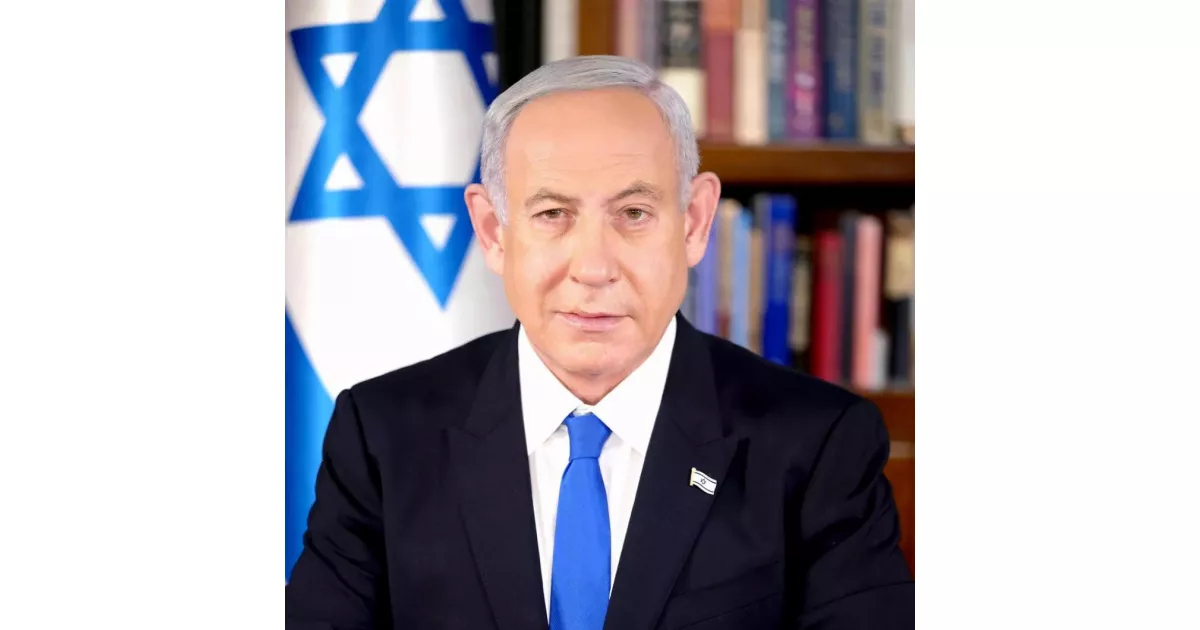Public opinion and media debates around Benjamin Netanyahu—discover key moments of controversy.
Benjamin "Bibi" Netanyahu is a prominent Israeli politician and diplomat. He currently serves as the Prime Minister of Israel, a position he assumed in 2022. Notably, he also held this office for two previous terms: from 1996 to 1999 and again from 2009 to 2021. His cumulative time in office makes him the longest-serving prime minister in Israeli history. He has been a central figure in Israeli politics for over two decades, shaping the country's policies and international relations.
1978: Netanyahu's affair and divorce
In 1978, while his then-wife Miriam Weizmann was pregnant, Netanyahu began an affair with Fleur Cates, a British student. This led to the end of his marriage with Weizmann shortly thereafter.
1987: Jonathan Pollard's Espionage
In 1987, Jonathan Pollard, an American, passed secret US documents to Israel.
1993: Opposition to Oslo Accords
In 1993, Benjamin Netanyahu argued against the Oslo peace process in his book A Place Among the Nations.
1993: Netanyahu confesses to affair
In 1993, Netanyahu publicly confessed on live television to having an affair with his public relations advisor, Ruth Bar, after a rival threatened to release a secretly recorded video.
1995: Netanyahu argues for tighter immigration laws to combat terrorism
In his 1995 book, Netanyahu argued that tightening immigration laws in the West is the most effective method to combat terrorism, advocating for an end to the "era of immigration free-for-all".
March 1996: Wave of suicide bombings in Israel
On 3 and 4 March 1996, Palestinians carried out two suicide bombings, killing 32 Israelis, with Peres seemingly unable to stop the attacks, leading to Netanyahu's victory.
1996: Opening of Western Wall Tunnel exit sparks rioting
In 1996, Netanyahu and Jerusalem's mayor Ehud Olmert decided to open an exit in the Arab Quarter for the Western Wall Tunnel, which Peres had put on hold. This decision sparked three days of rioting by Palestinians, resulting in the deaths of dozens of Israelis and Palestinians.
1996: Netanyahu's Likud party victory in the Israeli general election
In 1996, the bombing campaign and the Israeli intelligence services failure to prevent it, led to the defeat of Prime Minister Shimon Peres and the Israeli Labor Party in the Israeli general election and victory of the Likud party of Netanyahu, who opposed the Oslo Accords.
1997: Hamas Bombings and Mossad operation in Jordan
In 1997, Ali Fallahian authorized a Hamas bombing campaign. Hamas leader Khaled Meshal sent suicide bombers to detonate them simultaneously in Jerusalem in the 30 July Mahane Yehuda market bombings and 4 September Ben Yehuda street bombings, killing 21 Israelis. Also in 1997, Netanyahu authorized a Mossad operation to assassinate Hamas Mashal in Jordan. The plot was exposed and King Hussein demanded Israel to give the antidote and threatened to annul the peace treaty. Netanyahu relented after pressure by US President Bill Clinton and ordered the release of 61 Jordanian and Palestinian prisoners including Sheikh Ahmad Yassin. The incident sent the nascent Israeli-Jordanian relations plummeting.
1997: Police recommend Netanyahu be indicted on corruption charges
In 1997, police recommended Netanyahu be indicted on corruption charges for influence-peddling, accused of appointing an attorney general who would reduce the charges, but prosecutors ruled there was insufficient evidence to go to trial.
1999: Police recommend Netanyahu be tried for corruption
In 1999, the Israel Police recommended Netanyahu be tried for corruption for $100,000 in free services from a government contractor; Israel's attorney general did not prosecute, citing difficulties with evidence.
2000: Case 2000
"Case 2000" involves alleged attempts to strike a deal with the publisher of the Yedioth Ahronot newspaper group, Arnon Mozes, to promote legislation to weaken Yedioth's main competitor in exchange for more favorable political coverage.
2001: Netanyahu's Remarks on Peace Process
In 2001, Benjamin Netanyahu, reportedly unaware he was being recorded, made remarks about reneging on commitments made by previous Israeli governments as part of the peace process.
September 2002: Netanyahu lobbies for the invasion of Iraq
On 12 September 2002, Netanyahu lobbied for the invasion of Iraq, testifying under oath as a private citizen before the U.S. House of Representatives Government Reform Committee regarding the alleged nuclear threat posed by the Iraqi régime. He also testified, "If you take out Saddam, Saddam's regime, I guarantee you that it will have enormous positive reverberations on the region."
September 2002: Protest cancels Netanyahu's speech at Concordia University
On 9 September 2002, a scheduled speech by Netanyahu at Concordia University in Montreal was canceled due to pro-Palestinian protesters overwhelming security. He later accused the activists of supporting terrorism and "mad zealotry".
2007: Comparison of Iran to Nazi Germany
In a 2007 interview, Benjamin Netanyahu stated that the only difference between Nazi Germany and the Islamic Republic of Iran is that Nazi Germany sought atomic weapons after entering a worldwide conflict, while Iran is seeking atomic weapons first and will then start a world war.
2008: Repetition of Remarks Comparing Iran to Nazi Germany
In 2008, Benjamin Netanyahu repeated his remarks comparing Iran to Nazi Germany at a news conference.
January 2009: Continuing Settlement Expansion Policy
In January 2009, Benjamin Netanyahu informed Middle East envoy Tony Blair that he would continue the Israeli government's policy of expanding West Bank settlements, while refraining from building new ones.
February 2009: Netanyahu describes Iran as greatest threat to Israel
In February 2009, after being asked to be prime minister, Netanyahu described Iran as the greatest threat Israel has ever faced, stating that "Iran is seeking to obtain a nuclear weapon and constitutes the gravest threat to our existence since the war of independence."
August 2009: Statements on Israel's National Identity and Potential Compromises
In August 2009 Netanyahu stated that he wanted recognition of Israel as the national state of the Jewish people, and also wanted a security settlement. Also in August 2009, Mahmoud Abbas declared he would be willing to meet with Netanyahu at the UN General Assembly. Netanyahu was considering a compromise over construction in the West Bank, in exchange for freezing settlements.
September 2009: Netanyahu addresses UN on Iran
In September 2009, Netanyahu addressed the UN in New York, expressing a different opinion to Iranian president Ahmadinejad's speech. Netanyahu stated that those who believe Tehran is a threat only to Israel are wrong, characterizing the Iranian regime as motivated by fanaticism and aiming to return the world to medieval times.
September 2009: Address to the UN General Assembly
On 24 September 2009, Netanyahu addressed the UN General Assembly, stating that Iran posed a threat to world peace and the UN needed to prevent it from obtaining nuclear weapons. He also responded to Iranian president Mahmoud Ahmadinejad's questioning of the Holocaust.
2009: Influx of migrants from African countries into Israel
Between 2009 and 2013, approximately 60,000 people crossed into Israel from various African countries. Netanyahu expressed concern that "this phenomenon is very grave and threatens the social fabric of society, our national security and our national identity."
2009: Endorsement of a "Demilitarized Palestinian State"
In 2009, Netanyahu endorsed a "Demilitarized Palestinian State", stating he would accept a Palestinian state if Jerusalem remained the united capital of Israel, the Palestinians had no army, and gave up their demand for a right of return. He argued for a "natural growth" in Jewish settlements in the West Bank and endorsed a Palestinian state alongside Israel. He also stated he would be willing to meet with any "Arab leader" for negotiations without preconditions.
2009: Clinton voices support for Palestinian state
In 2009, US Secretary of State Hillary Clinton voiced support for the establishment of a Palestinian state – a solution not endorsed by Netanyahu, with whom she had pledged US cooperation. Netanyahu said negotiations with the Palestinians would be conditioned on them recognizing Israel as a Jewish state.
2009: Statements Against Gaza Pullout
In 2009, speaking at a cabinet meeting, Benjamin Netanyahu promised not to repeat the "mistake" of the Gaza pullout, asserting it brought neither peace nor security.
March 2010: Approval of Construction in Jerusalem
In March 2010, Israel's government approved the construction of 1,600 apartments in Ramat Shlomo, a Jewish housing development in northeast Jerusalem, despite U.S. opposition. The announcement coincided with a visit from U.S. Vice-president Joe Biden, and the US publicly condemned the plan. Netanyahu defended the decision by stating that previous Israeli governments had continuously permitted construction in the neighborhood.
September 2010: Agreement to Direct Talks and End of Settlement Freeze
In September 2010, Netanyahu agreed to enter direct talks with the Palestinians, mediated by the Obama administration, with the aim of reaching a "final status settlement." On 27 September 2010, the 10-month settlement freeze ended, and the Israeli government approved new construction in the West Bank, including East Jerusalem.
2011: Sarkozy and Obama criticize Netanyahu
During the 2011 G-20 Cannes summit, then-French president Nicolas Sarkozy was overheard saying to then-U.S. president Barack Obama, "I cannot bear Netanyahu, he's a liar", and Obama reportedly responded, "You're fed up with him, but I have to deal with him every day."
2011: Netanyahu arranges prisoner swap for Gilad Shalit
In 2011, Netanyahu arranged for 1000 Hamas and Fatah prisoners to be swapped for Gilad Shalit, including terrorists with "blood on their hands."
2011: Netanyahu faces military budget challenges
In 2011, the Israeli General Staff concluded that the armed forces could not maintain battle readiness under Netanyahu's proposed cuts. Netanyahu decided to cut social programs instead and promised to increase the defense budget by six percent.
September 2012: Netanyahu sets "red line" for Iran's uranium enrichment at UN
In September 2012, Netanyahu addressed the UN General Assembly and set forward a "red line" of 90% uranium enrichment for Iran, stating that reaching this level would pose an intolerable risk for Israel. He used a cartoon graphic of a bomb to illustrate his point.
2012: Netanyahu warns against Iranian nuclear bomb
Early in 2012, Netanyahu used the opening ceremony for Israel's Holocaust Remembrance Day to warn against the dangers of an Iranian nuclear bomb, claiming to follow the example of Jewish leaders during World War II. Immediately after the 2012 Burgas bus bombing, Netanyahu confirmed it had been undertaken in coordination with Iran.
2012: Netanyahu government passes "Prevention of Infiltration Law"
In 2012, the Netanyahu government passed the "Prevention of Infiltration Law", which mandated automatic detention of all people entering Israel without permission, including asylum-seekers.
August 2013: Ros-Lehtinen raises Wultz case with Israeli officials
In August 2013, Ros-Lehtinen, chair of the House Middle East and South Asia subcommittee, raised the issue while leading a congressional delegation to Israel, stressing to Israeli officials the importance of them providing the Wultz family what they need for their lawsuit.
October 2013: Netanyahu praises Persian history, warns of Iranian nuclear weapons
In an October 2013 interview, Netanyahu praised the history of Persia and warned that "If the Iranian regime has nuclear weapons, the Iranian people will never be free of dictatorship and will live in eternal servitude."
2013: Denial of Peace Talk Agreements Based on Green Line
In 2013, Benjamin Netanyahu denied reports that his government would agree to peace talks on the basis of the green line.
2013: Netanyahu caught between commitments to Wultz family and Chinese government
In 2013, Netanyahu found himself caught between conflicting commitments made to the family of American terror victim Daniel Wultz and the Chinese government regarding cooperation in the terror-financing case against Bank of China in the U.S. District Court.
2013: Netanyahu requests legislation to circumvent Supreme Court ruling on "Prevention of Infiltration Law"
In 2013, When the Supreme Court of Israel declared the "Prevention of Infiltration Law" illegal for permitting immediate and indefinite detention of asylum seekers from Africa, Netanyahu requested legislation to work around the Supreme Court ruling.
June 2014: Criticism of Palestinian Unity Government and Response to Teenager Kidnapping
In June 2014, Netanyahu spoke of his concerns regarding the agreement between Hamas and the Palestinian Authority to form a unity government. He was critical of the United States and European governments' decision to work with the Palestinian coalition government. He also blamed Hamas for the kidnapping and murder of three Israeli teenagers and launched a massive search and arrest operation on the West Bank, targeting members of Hamas. The bodies of the teenagers were discovered on 30 June 2014.
October 2014: Privatization Plan and Criticism of Settlements
In October 2014, Netanyahu's government approved a privatization plan to reduce corruption and politicization in government companies. Also in October 2014, Netanyahu called criticism of settlements "against the American values", which earned him a rebuke from the White House Press Secretary. Netanyahu explained that he does not accept residency restrictions for Jews.
October 2014: Obama administration official calls Netanyahu "chickenshit"
In October 2014, author Jeffrey Goldberg related a conversation in which Goldberg said that a senior official of the Obama administration called Netanyahu a "chickenshit" after Netanyahu accused U.S. president Barack Obama of "acting contrary to American values".
2014: Agreement to American Framework Based on Green Line
In 2014, Benjamin Netanyahu agreed to the American framework based on the green line and stated that Jewish settlers must be allowed the option of staying in their settlements under Palestinian rule.
March 2015: Address to the United States Congress
Benjamin Netanyahu delivered his 2015 address to the United States Congress, marking his third speech to a joint session. The day before announcing he would address Congress, he tried to derail a meeting between U.S. lawmakers and the head of Mossad, Tamir Pardo, who intended warning them against imposing further sanctions against Iran. Objections included the arrangement of the speech without the support and engagement of the Obama administration and the timing of the speech before Israel's March 2015 election.
October 2015: Netanyahu Claims Grand Mufti Inspired Hitler
In October 2015, Benjamin Netanyahu stated that the Grand Mufti of Jerusalem, Haj Amin al-Husseini, gave Adolf Hitler the idea to exterminate Jews. This claim was widely dismissed by historians, who noted that the meeting between al-Husseini and Hitler occurred after the mass murder of Jews had already begun. The October 2015 statement drew criticism, including from Israeli academics.
2015: Statements on Palestinian Statehood
As election day approached in 2015, Netanyahu stated that a Palestinian state would not be established in his term. He said that support of a Palestinian state is tantamount to yielding territory for radical Islamic terrorists to attack Israel. However, Netanyahu reiterated "I don't want a one-state solution. I want a peaceful, sustainable two-state solution. I have not changed my policy."
2015: Mossad assessment on Iran's nuclear program leaked
In 2015, cables were leaked revealing that Mossad's assessment at the time was that Iran did not appear ready to enrich uranium to levels required for a nuclear bomb.
March 2016: Coalition Crisis Over Western Wall Prayer Space
In March 2016, Netanyahu's coalition faced a potential crisis when ultra-Orthodox members threatened to withdraw over the government's proposed steps to create non-Orthodox prayer space at the Western Wall. They stated they would leave the coalition if the government offered any further official state recognition of Conservative and Reform Judaism in March 2016.
December 2016: US Abstains from UN Resolution, Kerry Criticizes Israel
In December 2016, the United States, under the Obama Administration, abstained from United Nations Security Council Resolution 2334, effectively allowing it to pass. Netanyahu strongly criticized the UN Resolution in response.
2016: Israel to wait until after 2016 presidential election to repair relationship with White House
The relationship between Netanyahu and the Obama administration had become problematic enough that Goldberg reported that his conversations with Netanyahu and other Israeli officials indicated that Israel would wait until after the 2016 presidential election before attempting to repair the relationship with the White House.
January 2017: Israel Withdraws Dues from UN
On 6 January 2017, the Israeli government withdrew its annual dues from the organization, which totaled $6 million in United States dollars, in response to criticism and actions perceived as anti-Israel.
January 2017: Police Investigate Netanyahu in 'Case 1000' and 'Case 2000'
Since January 2017, Netanyahu has been investigated by Israeli police in two connected cases, "Case 1000" and "Case 2000".
August 2017: Police Confirm Netanyahu Suspected of Crimes
In August 2017, Israeli police confirmed that Netanyahu was suspected of crimes involving fraud, breach of trust, and bribes in "Case 1000" and "Case 2000". The next day, it was reported that the prime minister's former chief of staff, Ari Harow, had signed a deal with prosecutors to testify against Netanyahu.
October 2017: Israel Announces Withdrawal from UNESCO
In October 2017, shortly after the US announced the same action, Netanyahu's government announced it was leaving UNESCO due to what it saw as anti-Israel actions by the agency.
December 2017: Israel Officially Notifies UNESCO of Withdrawal
In December 2017, the Israeli government officially notified UNESCO of its withdrawal, solidifying the decision announced in October due to perceived anti-Israel actions by the agency.
2017: Call for Death Penalty in Halamish Attack
In 2017, Benjamin Netanyahu called for the death penalty to be imposed on the perpetrator of the 2017 Halamish stabbing attack, and his government introduced a bill allowing the death penalty for terrorism.
2017: Showing Fake Video to Trump
In 2017, former US Secretary of State Rex Tillerson stated that Benjamin Netanyahu showed Donald Trump a fake video of Palestinian president Abbas calling for the killing of children in order to change Trump's position on the Israeli-Palestinian conflict.
February 2018: Police Recommend Netanyahu Be Charged with Corruption
In February 2018, Israeli police recommended that Netanyahu be charged with corruption. According to a police statement, sufficient evidence exists to indict the prime minister on charges of bribery, fraud, and breach of trust in "Case 1000" and "Case 2000". Netanyahu responded that the February 2018 allegations were baseless.
April 2018: Netanyahu Accuses Iran of Violating Nuclear Deal
In April 2018, Netanyahu accused Iran of not upholding its end of the Iran nuclear deal, presenting a cache of documents detailing Iran's nuclear program. Iran denounced Netanyahu's April 2018 presentation as "propaganda".
April 2018: Erdoğan calls Israel "terror state" and Netanyahu "terrorist"
In April 2018, Turkish President Recep Tayyip Erdoğan escalated the spat by addressing to Netanyahu directly, saying, "you are a tyrant. You are a tyrant who slaughters 7-year-old Palestinian kids", and further calling Israel "terror state" and Netanyahu "terrorist".
July 2018: Knesset Passes Nation-State Bill
In July 2018, the Knesset passed the Nation-State Bill, a Basic Law supported by Netanyahu's coalition government. Analysts viewed the July 2018 bill as advancing a right-wing agenda.
November 2018: Recommendation for Indictment in Corruption Cases
In November 2018, it was reported that Economic Crimes Division Director Liat Ben-Ari recommended indictment for both cases.
2018: Netanyahu criticizes Polish PM's comment on Jewish perpetrators of the Holocaust
In 2018 at the Munich Security Conference, Polish prime minister Mateusz Morawiecki said "it is not going to be seen as criminal to say that there were Polish perpetrators, as there were Jewish perpetrators ... not only German perpetrators" implicated in the Jewish Holocaust. Netanyahu called his Polish counterpart's comment "outrageous".
2018: Netanyahu Investigated in 'Case 4000'
In 2018, Netanyahu was also investigated in "Case 4000", where he was suspected of giving regulatory favors to Shaul Elovitch, owner of Bezeq telecommunication company, in exchange for positive publications in news website Walla!.
2018: Preliminary Vote on Death Penalty Bill
In 2018, a preliminary vote in parliament favored making it easier for judges to hand down the death penalty, with 52 of 120 members voting in favor.
2018: Start of Israeli political crisis
The 2018–2022 Israeli political crisis resulted in a rotation agreement between Netanyahu and Benny Gantz.
February 2019: Attorney General Announces Intent to File Indictments Against Netanyahu
In February 2019, the Israeli attorney general announced his intent to file indictments against Netanyahu on bribe and fraud charges in "Case 1000", "Case 2000", and "Case 4000".
March 2019: Netanyahu and Erdoğan exchange insults after being denounced as racist
In March 2019, after being denounced by Turkey as a racist for saying that Israel was the nation-state of the Jewish people only, Netanyahu called Erdoğan a dictator and mocked him for imprisoning journalists in a tweet.
April 2019: Netanyahu Brokers Deal Uniting Jewish Home with Otzma Yehudit
Prior to the April 2019 Israeli legislative election, Netanyahu helped broker a deal that united the Jewish Home party with the far-right Otzma Yehudit party, forming the Union of the Right-Wing Parties. This deal was criticized for associating with a party widely characterized as racist.
November 2019: Netanyahu Formally Indicted
Netanyahu was formally indicted on 21 November 2019, facing potential prison time if convicted. He is the first sitting prime minister in Israel's history to be charged with a crime.
2019: Statements on Bolstering Hamas to Thwart Palestinian State
In 2019, Benjamin Netanyahu stated at a private Likud party meeting that supporting Hamas and transferring money to them was part of a strategy to isolate Palestinians in Gaza from those in the West Bank and thwart the establishment of a Palestinian state.
2019: Indicted on charges of breach of trust, bribery and fraud
In 2019, Netanyahu was indicted on charges of breach of trust, bribery and fraud, and relinquished all ministerial posts except prime minister.
January 2020: Netanyahu Officially Charged
On 28 January 2020, Netanyahu was officially charged.
May 2020: Netanyahu's Criminal Trial Set to Begin
Netanyahu's criminal trial was set to begin on 24 May 2020, having been initially scheduled for March of that year but delayed due to the COVID-19 pandemic.
2020: Netanyahu praises U.S. airstrike that killed Iranian General Soleimani
In 2020, Netanyahu praised the U.S. airstrike in Baghdad that killed Iranian General Qasem Soleimani, stating that Trump had acted "swiftly, forcefully and decisively".
2020: Collapse of rotation agreement
In 2020, the rotation agreement between Netanyahu and Benny Gantz collapsed, leading to a 2021 election.
June 2021: Removed from premiership
In June 2021, Netanyahu was removed from the premiership.
2022: Netanyahu praises Putin in his book
In his 2022 book, Netanyahu wrote positively about Russian president Vladimir Putin and describes him as "smart, sophisticated and focused on one goal – returning Russia to its historical greatness".
2022: Settlement Construction Increases
In its first six months, construction of 13,000 housing units in settlements, almost triple the amount advanced in the whole of 2022.
February 2023: Government Approves Legalization of Settler Outposts
In February 2023, the government approved the legalization of nine settler outposts in the occupied West Bank. Israeli peace groups condemned the move as de jure annexation of the occupied territories.
April 2023: Netanyahu's Criminal Trial Ongoing
As of April 2023, Netanyahu's criminal trial was still ongoing.
June 2023: Netanyahu Explains Refusal to Send Weapons to Ukraine
In June 2023, Netanyahu said Israel is concerned "with the possibility that systems that we would give to Ukraine would fall into Iranian hands and could be reverse engineered, and we would find ourselves facing Israeli systems used against Israel."
September 2023: Continued Backing of Qatari Payments to Gaza
As late as September 2023, Benjamin Netanyahu continued backing Qatari transfers of cash to Gaza.
December 2023: Criticism and Accusations During Hostage Meeting
In December 2023, Netanyahu faced criticism during a meeting with released Israeli hostages. One hostage accused him of putting politics "above the return of the kidnapped."
December 2023: South Africa v. Israel case before the International Court of Justice
In December 2023, Netanyahu's government was accused of orchestrating the genocide in Gaza, culminating in the South Africa v. Israel case before the International Court of Justice.
December 2023: Genocide Accusations at International Court of Justice
Israel under Netanyahu has been accused of committing genocide in Gaza in the South Africa v. Israel case before the International Court of Justice in December 2023.
2023: Judicial reform and protests
In early 2023, Netanyahu's coalition pursued judicial reform, which was met with large-scale protests.
2023: Criticism and Protests Against Netanyahu
Netanyahu faced criticism in 2023 for presiding over Israel's biggest intelligence failure in 50 years, with protests calling for his removal. The war led to increased opposition to Netanyahu due to failure to anticipate the Hamas-led attack, with increased calls for Netanyahu's resignation.
2023: Netanyahu engages in diplomacy with Xi Jinping due to strained US-Israel ties
Since 2023, Netanyahu and Chinese president Xi Jinping have been engaged in diplomacy, arising due to strained ties between the US and Israel. The diplomatic situation has been made complicated due to the Gaza war, where China has remained neutral.
May 2024: ICC Prosecutor Seeks Arrest Warrant for Netanyahu
In May 2024, Karim Khan, the prosecutor of the International Criminal Court, announced his intention to apply for an arrest warrant for Netanyahu on counts of alleged war crimes and crimes against humanity.
July 2024: Address to US Congress and Meeting with Donald Trump
In July 2024, Benjamin Netanyahu addressed a joint session of the United States Congress amidst protests to gain support for the Gaza war, referring to protestors as "useful idiots" and promising "total victory". He also met with Donald Trump at Mar-a-Lago, criticizing Kamala Harris's stance on the Gaza conflict.
October 2024: Drone Attack on Netanyahu's Residence
In October 2024, Benjamin Netanyahu's residence in Caesarea was attacked by a drone, believed to be from Lebanon. Netanyahu was not present, and there were no casualties. He accused Hezbollah of attempting to assassinate him.
October 2024: Survived assassination attempt and ordered invasion of Lebanon
In October 2024, Netanyahu survived an assassination attempt and ordered an invasion of Lebanon to destroy Hezbollah.
November 2024: Firing of Defense Minister and ICC Arrest Warrant
In November 2024, Benjamin Netanyahu fired Defense Minister Gallant, who advocated for a diplomatic deal. This led to protests. Later in November 2024, the International Criminal Court issued arrest warrants for Netanyahu, Gallant, and Hamas commander Mohammed Deif for alleged war crimes during the Gaza war, which Netanyahu dismissed as "absurd and false lies" and "antisemitic".
November 2024: ICC issued arrest warrant for Netanyahu
In November 2024, the International Criminal Court (ICC) issued an arrest warrant for Netanyahu for alleged war crimes and crimes against humanity as part of the ICC investigation in Palestine.
December 2024: Directed an invasion of Syria
In December 2024, after the fall of the Assad regime, Netanyahu directed an invasion of Syria.
2024: Pakistan Designates Netanyahu as a "terrorist"
In 2024, Pakistan officially designated Benjamin Netanyahu a "terrorist", accusing him of responsibility for atrocities in Gaza.
January 2025: End of Gaza War Ceasefire
In January 2025, the Gaza war ceasefire effectively ended when Israel launched a surprise attack on the Gaza Strip on March 18, 2025.
March 2025: Israel Launches Surprise Attack on Gaza and Firing of Shin Bet Chief
On March 18, 2025, Israel launched a surprise attack on the Gaza Strip, ending the ceasefire. Netanyahu's corruption trial was postponed as a result. Later in March 2025, Netanyahu fired Ronen Bar, the chief of Shin Bet, citing a loss of confidence; Bar accused the government of firing him for investigating Qatar's involvement in the Prime Minister's Office.
June 2025: Netanyahu authorizes airstrikes against Iran, starting Iran-Israel war
In June 2025, Netanyahu authorized airstrikes against Iran, marking the beginning of the Iran–Israel war. Netanyahu stated the goal of the operation was to dismantle Iran's nuclear capabilities, framing it as an opportunity for regime change.
August 2025: Statements on "Historic and Spiritual Mission" and Greater Israel
In August 2025, Netanyahu stated in an interview that he was on a "historic and spiritual mission" and "very" attached to the vision of Greater Israel, including the Palestinian territories.
November 2025: Netanyahu Asks for Presidential Pardon
On 30 November 2025, Netanyahu formally asked for a pardon from president Isaac Herzog.
2025: Shin Beth Investigation into Qatar Ties
In 2025, Shin Beth started an investigation into the alleged ties between Benjamin Netanyahu's advisors and Qatar.
Mentioned in this timeline

Donald John Trump is an American politician media personality and...

Vladimir Vladimirovich Putin is a Russian politician and former intelligence...

Barack Obama the th U S President - was the...
Ukraine is a country in Eastern Europe the second-largest on...

Hillary Diane Rodham Clinton is a prominent American politician lawyer...

Kamala Harris is an American politician and attorney She served...
Trending
57 minutes ago Molly Ringwald joins Yellowjackets' final season, adding to the show's legendary cast.

57 minutes ago Nuggets' Adelman evaluates team; Gordon's injury sidelines him against OKC.

57 minutes ago Katie Boulter faces Jasmine Paolini in WTA Merida Quarterfinals; Hon Prediction

5 months ago Shonda Rhimes Shocked by 'Grey's Anatomy' Deaths, Compares Episodes to 'Snuff Film'

58 minutes ago Christian Horner's Red Bull F1 Exit: Verstappen's Camp Uninvolved, 'Drive to Survive' Reveals Drama

58 minutes ago Zhang defeats Navarro; Paolini trending amid WTA Sunshine Swing struggles for Americans.
Popular

Jesse Jackson is an American civil rights activist politician and...

Michael Joseph Jackson the King of Pop was a highly...

XXXTentacion born Jahseh Dwayne Ricardo Onfroy was a controversial yet...

Hillary Diane Rodham Clinton is a prominent American politician lawyer...

Barack Obama the th U S President - was the...

Susan Rice is an American diplomat and public official prominent...


